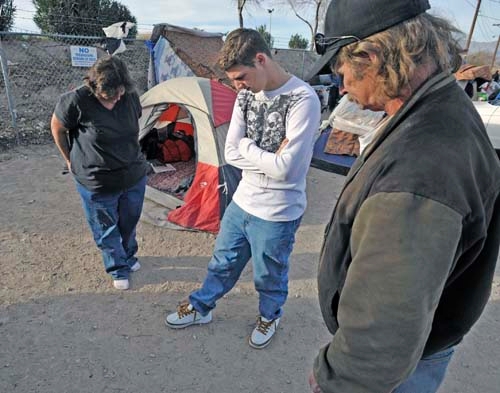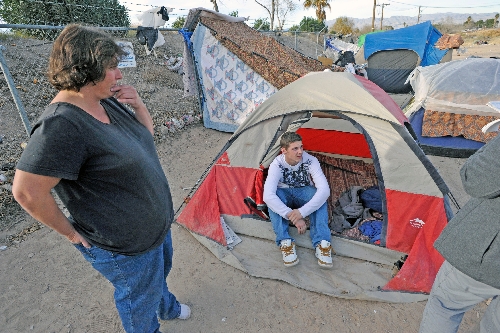Occupants told to leave Las Vegas homeless encampment
The first thing Michael McGrath does when he gets home from school is search for his knife.
The 17-year-old finds it tucked inside a dusty two-man tent he shares with his parents at a growing homeless encampment on Owens Avenue just west of Interstate 15.
"I don't like being out here without a knife," he said while slipping the folding 4-inch blade into the front pocket of his jeans. "Something's going on here every night. Drug deals, you name it."
But as scary as this place is, Michael is more afraid of losing it.
Las Vegas police visited the encampment early Monday. Citing sanitation issues, they handed out fliers telling the scores of campers that they are trespassing and need to move along so the area can be cleaned later this week. Those who refuse can be cited or arrested, though police said later Monday they don't plan to do either.
Regional officials in recent weeks have kept a wary eye on the encampment, the largest they have seen go up in the lot in years.
"It's growing," said Tyrone Thompson, a coordinator for the Southern Nevada Regional Planning Coalition's committees on homelessness and youth. "It's getting out of control."
Tents and other makeshift shelters line the boundaries of the empty lot at the edge of Las Vegas's homeless corridor, where people gather to be near shelters that serve free meals. The number of people living on the streets in and around the area more than tripled since 2009, according to a January 2011 homeless count.
Men and women squat outside the tents. Michael appears to be the youngest person there. He stands out in other ways as well. His hair is neatly trimmed, his clothes and shoes clean. He looks like a typical teenager, not the resident of a homeless encampment.
As the Rancho High School senior arrives home Monday afternoon, an argument is breaking out between two men not far from his family's tent. It's hard to tell what the argument is about, but one man screams at the other to "get off my property!" Nearby, a rail-thin woman in a dirty miniskirt dances by herself. A couple of guys call out a greeting: "Hi, Mikey!"
The second thing Michael does when he gets home from school is make sure his parents have something to eat.
He opens his wallet, takes out four dollars and hands the money to his father, Mark McGrath.
"Go get us some Gatorades or something," Michael said. "Something to eat, too."
Then he explains: "I manage the money."
That is the money his parents earn selling plasma -- $140 a week.
It's clear Michael often acts as head of the family, and their plight weighs heavily on his young shoulders.
"Sometimes it's just hard, you know?" he said. "I don't know when we'll eat, when the cops will show up, where else there is for us to go."
He also blames himself.
"Maybe if I wasn't in the picture, they would be able to support themselves," he said of his parents.
The three have been staying at the encampment about two weeks. They've been homeless off and on for about a year since Michael's dad lost his job in construction. His mother last worked months ago, selling bottles of water on the Strip, which is illegal without a license. She quit when she got busted, she said.
They don't want to go to a local shelter because they may have to separate. Michael's mom, Jennifer McGrath, also is afraid Child Protective Services might take him away.
A team of outreach workers will descend on the encampment, which is on private property, early Wednesday, trying to match up those who remain with existing housing and other services before city cleanup crews arrive Thursday.
"We are going to encourage them to accept the resources we are providing them right then and there," said Officer Marc Washington, a member of the Metropolitan Police Department's Homeless Evaluation Liaison Project, HELP, a team of officers tasked with enforcing the law and reaching out to the down-and-out in the area.
"We won't take anybody to jail," he said. "It's an extremely benevolent approach."
Thompson believes there are enough resources to house every person at the encampment who wants shelter. The trick is matching them up.
"The last thing we want to do is just shift people" around, he said.
Resources for entire families like Michael's are limited, though.
"That exact scenario is one we've been working on," Thompson said. "How do we meet the needs of that family so they are not separated?"
Linda Lera-Randle El, director of the Straight from the Streets homeless outreach program, said all the housing in the world won't solve the local homeless problem. That is because many of the homeless have substance abuse and mental health issues that helped land them on the street in the first place.
"They have so many issues that putting them in an apartment won't help," she said. "It will make the landscape nicer, the area look better. But somebody's still going to be tasked with what do we do with them after that."
Michael, a B and C student, is on track to graduate this year. He turns 18 in five months and looks forward to being able to sell plasma with his parents.
"That will be another $70 a week. Maybe we can get a place."
Sometimes, after school, Michael stops by McDonald's with friends before walking home. He buys a burger and soda and gets "to be a normal kid for a while."
He showers and keeps clean clothes at a friend's house.
On Monday afternoon, he tells his mother to put some shoes on. "There's glass all over. You might cut your feet."
Later he will do his homework by streetlight.
Review-Journal writer Henry Brean contributed to this report. Contact reporter Lynnette Curtis at lcurtis@ reviewjournal.com.
YOU CAN HELP
To volunteer or donate to regional efforts to help the homeless, visit helphopehome.org or call the United Way at 734-2273.























